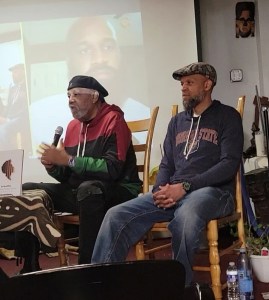By Reginald Williams,
Special to the AFRO
A two-and-one-half-hour panel discussion recently took place at Sankofa Video Books and Cafe on Georgia Avenue in Northwest D.C., delving into a discussion on the nuances of what it means to be a Black boy and man. The panel explored what was required of boys to survive, and what it takes for Black men to thrive in today’s society.
In 2023, as the push to be fully conscious of gender identity and the differences in biological determinants of sex, one must be culturally responsible when defining a “boy.” At least Raymond A. Winbush, Ph. D., understands that caution must be exercised when distinguishing gender definitions.
“Increasingly, it is becoming hard to decide what a boy is,” explained Winbush, a research professor and director of the Institute for Urban Research at Morgan State University.
When Kamau Grimes, symposium host of Thrive Black Boy: Nurturing the Mental Health of Black Male Adolescents, asked Winbush to provide a foundational definition for a boy, Winbush, the author of “The Warrior Method: A Parents’ Guide to Rearing Healthy Black Boys,” said, “a boy is a male child.”
The world for Black boys is increasingly one where their lives are played out almost always on defense— doing all they can to survive, making it difficult for them to thrive.
Responding to Grimes’ question about what it means to see Black boys thriving, Winbush said, “Thriving for Black boys is where he can do anything he wants. He’s not restrained by the racism and White supremacy imposed upon Black boys. He can walk down the street at night. He can walk down the street in the daytime. He can go to whatever college he wants to – if he wants to do that , and get a job wherever he wants.”
Joining Winbush in the discussion was Jeff Menzise, associate professor at the Institute of Urban Research School of Graduate Studies at Morgan State University. Brennan Allan Steele, a seventh grade math teacher in Memphis, Tenn., and founder of the Breathe Brotha movement, also joined the discussion via video.
In any holistic discussion about Black boys, the perspective that must be lifted are the challenges Black boys face in their quest to become men and what is required of them to mature into fully functional Black men. Too many men are incarcerated by the unaddressed wounds that surfaced while just boys.
Surviving is the essential requirement for Black boys to become men, offered Menzise. “A Black boy has to survive to become a Black man.”
Beyond survival, Menzise posed a question that should be asked to Black boys: “What kind of man do they want to be? That puts in their head that there are different types of Black men. Even though they have seen and experienced different types of Black men, they may have never thought like that. ‘You mean I can control my own destiny of what type of man I can become?’”
Menzise’s understanding of the various types of Black men derives from an experiential space. The Cincinnati, Ohio native, by his admission, arrived at Fisk University with a hood mentality, pants sagging, smoking weed and living somewhat irresponsibly. At Fisk, he met Winbush, who represented the type of man that he would desire to become.
“Any and everybody I’ve encountered as I’ve been growing into a Black man has helped me to become the Black man that I am– like Dr. Winbush. When I came to Fisk, he was one of my teachers. I took my first psychology classes under Dr. Winbush.”
“Dr. Winbush would toss me the keys to his green Benz and trust and charge me to pick up some of the VIP guests coming to campus like John Conyers, Dorothy Height, Chuck D [and] Bishop Desmond Tutu,” said Menzise. “He instilled that trust that gave me a deep sense of responsibility. Dr. Winbush helped me to understand that I was living for more than myself. I knew that I couldn’t let him down.”
White supremacy and racism—societal constructs that behave like tailored nooses, occupied most of the evening’s discussion; however, Steele breathed a unique perspective into the conversation.
The constant everyday microaggressions that Black boys must navigate to just survive seldom leave them with an opportunity to simply breathe—intentionally. Steele, author of “Breathe. A guided Healing Journal for Black Men,” shared how important it is for Black boys and men to take the time to breathe.
“We’ve seen and heard it many times: the last phrase of unarmed Black boys and men before being murdered is often ‘I can’t breathe.’ The absence of breath indicates the absence of life. Thus, a Black boy’s breathing indicates he is living, surviving and thriving despite the systems, experiences and messages around that tell him that his existence is dispensable,” said Steele. “Every breath a Black boy takes matters because it means he has the ability to dream, to experience joy, to be courageous, and to live fully.”
Breathing is an autonomic process that most take for granted. But breathing with intent is healing.
“Breathing in the physical sense does wonders for your mental and emotional state,” said Steele. “It helps us pause, recenter, and step back in the midst of stress, overwhelm, and the pressures of everyday life. Not only should Black boys practice breathing– literally– but they should also take space to breathe figuratively as well. This could look like being introspective, identifying their emotions daily, starting a journaling practice, or creating intentional spaces to be connected with other Black boys and men where they can just be.”
Reginald Williams, the author of “A Marginalized Voice: Devalued, Dismissed, Disenfranchised & Demonized” writes on Black men and Holistic Health concerns. Please email bookreggie@reginaldwilliams.org or visit amvonlinestore.com for more information.
The post A time to heal: Black men gather in D.C. to discuss Black manhood and mentorship appeared first on AFRO American Newspapers .











